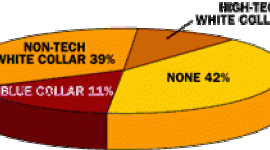Internet Addiction FAQs
1. What is Internet Addiction?
Internet addiction is defined as any online-related, compulsive behavior which interferes with normal living and causes severe stress on family, friends, loved ones, and one's work environment. Internet addiction has been called Internet dependency and Internet compulsivity. By any name, it is a compulsive behavior that completely dominates the addict's life. Internet addicts make the Internet a priority more important than family, friends, and work. The Internet becomes the organizing principle of addicts' lives. They are willing to sacrifice what they cherish most in order to preserve and continue their unhealthy behavior.
2. How do you know if you have Internet addiction (IA)?
No single behavior pattern defines Internet addiction. These behaviors, when they have taken control of addicts' lives and become unmanageable, include: compulsive use of the Internet, a preoccupation with being online, lying or hiding the extent or nature of your online behavior, and an inability to control or curb your online behavior. If your Internet use pattern interferes with your life in any way shape or form, (e.g. does it impact your work, family life, relationships, school, etc.) you may have a problem. In addition, if you find that you are using the Internet as a means to regularly alter your mood you may be developing a problem. It is important to note that it is not the actual time spent online that determines if you have a problem, but rather how that time you spend impacts your life. To learn more, you can take our Internet Addiction Test.
3. What causes Internet addiction?
Internet addiction can be understood by comparing it to other types of addictions. Individuals addicted to alcohol or other drugs, for example, develop a relationship with their "chemical(s) of choice" -- a relationship that takes precedence over any and all other aspects of their lives. Addicts find they need drugs merely to feel normal. In Internet addiction, a parallel situation exists. The Internet -- like food or drugs in other addictions -- provides the "high" and addicts become dependent on this cyberspace high to feel normal. They substitute unhealthy relationships for healthy ones. They opt for temporary pleasure rather than the deeper qualities of "normal" intimate relationships. Internet addiction follows the same progressive nature of other addictions. Internet addicts struggle to control their behaviors, and experience despair over their constant failure to do so. Their loss of self-esteem grows, fueling the need to escape even further into their addictive behaviors. A sense of powerlessness pervades the lives of addicts.
How many people suffer from Internet addiction?
Estimates suggest that five to ten percent of the population.
5. What are the types of Internet Addiction?
Cybersex and cyberporn addiction is the most common form of Internet addiction. The widespread availability of sexual content online has given rise to a new form of sexual addiction as almost 60% of the cases of online sexual compulsivity seen result exclusively from Internet use. New problems related to online affairs have also emerged as a sub-type of Internet abuse given the widespread popularity of interactive online applications such as chat rooms and instant messaging leading to surprising new trends in divorce and marital separation. Finally addictions to eBay, online gambling, and multi-user role-playing online games are growing new forms of Internet abuse. For more information, you can also read our article on Compulsive Surfing.
6. Do men and women differ in what they become addicted to?
Gender influences the types of applications and underlying reasons for Internet addiction. Men tend to seek out dominance and sexual fantasy online, while women seek out close friendships, romantic partners, and prefer anonymous communication in which to hide their appearance. Men are more likely to become addicted to online games, cyberporn, and online gambling, while women are more likely to become addicted to chatting, instant messaging, eBay, and online shopping. It seems to be a natural conclusion that attributes of gender played out in cyberspace parallel the stereotypes men and women have in our society.
7. Who is most at risk for developing Internet addiction?
National surveys revealed that over 50% of Internet addicts also suffered from other addictions, mainly to drugs, alcohol, smoking, and sex. Trends also showed that Internet addicts suffer from emotional problems such as depression and anxiety-related disorders and often use the fantasy world of the Internet to psychologically escape unpleasant feelings or stressful situations. Internet addicts also suffer from relationship problems in almost 75% of the cases and use interactive online applications such as chat rooms, instant messaging, or online gaming as a safe way of establishing new relationships and more confidently relating to others through the Internet.
8. What can you do about Internet addiction if you feel you have it?
Treatment options for Internet addicts include inpatient, outpatient, and aftercare support, and self-help groups. Treatment options may also include family counseling, support groups, and educational workshops for addicts and their families to help them understand the facets of belief and family life that are part of the addiction. Unlike recovering alcoholics who must abstain from drinking for life, treatment for Internet addiction focuses on moderation and controlled use of the Internet, much in the way those suffering from eating disorders must relearn healthy eating patterns. Dr. Young's program is based on cognitive-behavioral techniques to achieve moderation and controlled use along with a comprehensive psychosocial approach to address the underlying problems in a person's life creating the need to use the Internet as a way of escape. Dr. Young also focuses on the spiritual principals of the Twelve Steps and incorporates the expertise of the most knowledgeable health care professionals in the field of Internet addiction.
9. Is Internet addiction recognized by the professional healthcare community?
Internet addiction was first brought to the forefront in Dr. Kimberly Young's 1998 book, Caught in the Net: How to Recognize the Signs of Internet Addiction and a Winning Strategy for Recovery (Wiley). Since then, thousands of people have come forward seeking help, and more and more professionals are being trained to identify and treat Internet addiction.
next: Do You Spend Too Much Time Online?
~ all center for online addiction articles
~ all articles on addictions
APA Reference
Staff, H.
(2009, January 2). Internet Addiction FAQs, HealthyPlace. Retrieved
on 2026, March 1 from https://www.healthyplace.com/addictions/center-for-internet-addiction-recovery/internet-addiction-faqs

